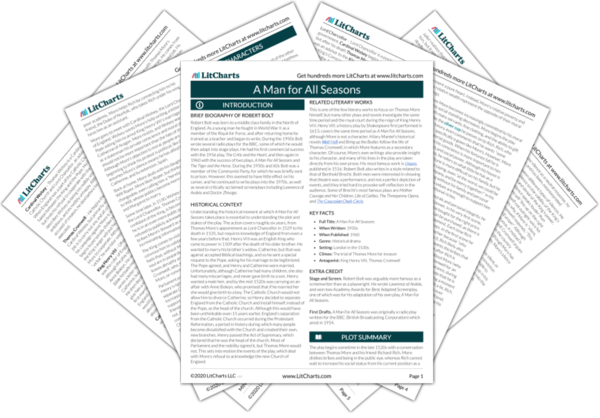Bolt uses many forms of water and water-related objects (the ocean, tides, the currents of the river, boats) to represent the often unknowable nature of religion and morality. Unlike human laws, which are represented by dry land, good and evil, like the ocean, are impossible to fully understand. Thomas More describes the law as a forest in which he is a competent forester. In contrast, when describing “the currents and eddies of right and wrong,” More claims that he cannot navigate and is no voyager.
Water, Tides, and the Sea Quotes in A Man for All Seasons
The great thing’s not to get out of your depth…What I can tell them’s common knowledge! But now they’ve given money for it and everyone wants value for his money. They’ll make a secret of it now to prove they’ve not been bilked…They’ll make it a secret by making it dangerous…Mm…Oh, when I can’t touch the bottom I’ll go deaf, blind, and dumb. (He holds out coins) And that’s more than I earn in a fortnight!

Unlock explanations and citation info for this and every other A Man for All Seasons quote.
Plus so much more...
Get LitCharts A+More: …I’m not a God. The currents and eddies of right and wrong, which you find such plain sailing, I can’t navigate. I’m no voyager. But in the thickets of the law, oh, there I’m a forester. I doubt if there’s a man alive who could follow me there, thank God…
Alice; While you talk, he’s gone!
More: And go he should, if he was the Devil himself, until he broke the law!
Roper: So now you’d give the Devil benefit of law!
More: Yes. What would you do? Cut a great road through the law to get after the Devil?
Roper: I’d cut down every law in England to do that!
More: Oh? And when the last law was down, and the Devil turned round on you—where would you hide, Roper, the laws all being flat? This country’s planted thick with laws from coast to coast—man’s laws, not God’s—and if you cut them down—and you’re just the man to do it—d’you really think you could stand upright in the winds that would blow then? Yes, I’d like to give the Devil benefit of law, for my own safety’s sake.
I’m a prominent figure. Someone somewhere’s collecting information about Cromwell. Now no more shirking; we must make a start. There’s a stuffed swan if you please. Will, I’d trust you with my life. But not your principles. You see, we speak of being anchored to our principles. But if the weather turns nasty you up with an anchor and let it down where there’s less wind, and the fishing’s better. And “Look,” we say, “look, I’m anchored! To my principles!”
Then it’s a poor argument to call it “neat,” Meg. When a man takes an oath, Meg, he’s holding his own self in his own hands. Like water. And if he opens his fingers then—he needn’t hope to find himself again. Some men aren’t capable of this, but I’d be loathe to think your father one of them.
Cromwell: I put it to the Court that the prisoner is perverting the law—making smoky what should be a clear light to discover to the Court his own wrongdoing!
More: The law is not a “light” for you or any man to see by; the law is not an instrument of any king. The law is a causeway upon which, so long as he keeps to it, a citizen may walk safely. In matters of conscience—
Cromwell: The conscience, the conscience…
More: The word is not familiar to you?
Cromwell: By God, too familiar! I am very used to hear it in the mouths of criminals!












